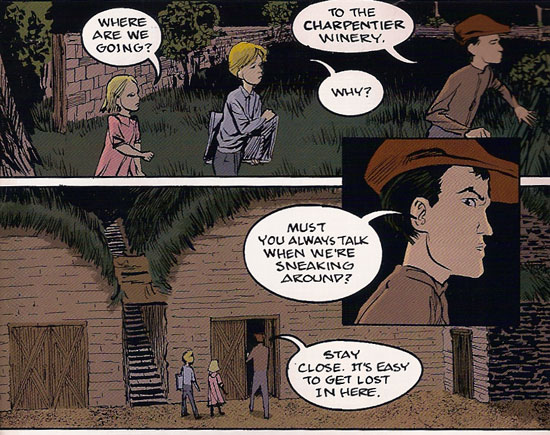Read This: Resistance, Book 1

I confess to a lack of objectivity when it comes to Resistance, Book 1, as the artist on the graphic novel, Leland Purvis, is a good friend. But I would have been impressed with this story even without that personal connection—you know how Alan Furst has, in novel after novel, crafted masterful dramas out of the years leading up to the Second World War and the early phases of the conflict, before the United States joined the fray? Carla Jablonski is working the same territory here, and like Furst, she understands that covert operations usually isn’t a sleek or glamorous field, but a series of small actions performed by ordinary people—in this story, even the children of the Tessier family are drawn into the underground movement against the occupying German forces.
Leland uses young Paul’s sketchbook as an effective tool for conveying many of the story’s emotional subtexts, but his compositions also underscore the tensions of the Tessier childrens’ big mission, reminding the reader that it isn’t an adventure but a matter of life and death. Resistance is the first volume in a trilogy; I’m very much looking forward to seeing where the story goes in subsequent volumes, whether Jablonski stays with the Tessiers or shifts focus to other members of the resistance movement.
8 March 2010 | read this |
Building Strong Online Communities Around Your Blogs
A few months ago, I got on the phone with John Scalzi and Teresa Nielsen Hayden and peppered them with questions about how they had cultivated the robust communities that have sprung up in the comments sections of their respective blogs for a magazine called Associations Now. That conversation is now online, and I’m really pleased with how the article turned out. Here’s a sampling of their advice:
Nielsen Hayden: You know the theory that one of the things you have to do to keep communities from falling into crime is to fix the broken windows? The same thing happens on a website. When people first come into it, they look around and they see what’s happening there, and if they have any sensitivity at all, they will moderate their behavior to suit what’s going on. If you let things get started in such a way that it looks like an uncivilized frontier, then people will feel justified in behaving badly. That will drive off exactly the people you’d rather have around, while it encourages more bad behavior.
Scalzi: You don’t want to be at a point where what you end up having is only the people who will end up agreeing with you. That’s going to get very boring and megalomaniacal. It’s much more interesting to have conversations with people who say, “You know, I like what you write, but your politics are crazy.” And as long as they can do it politely and have a good time with everybody else, that’s perfectly fine. You do have to come in with the idea that you don’t mind people telling you you’re wrong … and that’s something that’s difficult for people to learn. You have to train yourself. You have to moderate yourself as well as the community.
7 March 2010 | uncategorized |

 Our Endless and Proper Work is my new book with Belt Publishing about starting (and sticking to) a productive writing practice.
Our Endless and Proper Work is my new book with Belt Publishing about starting (and sticking to) a productive writing practice. 
